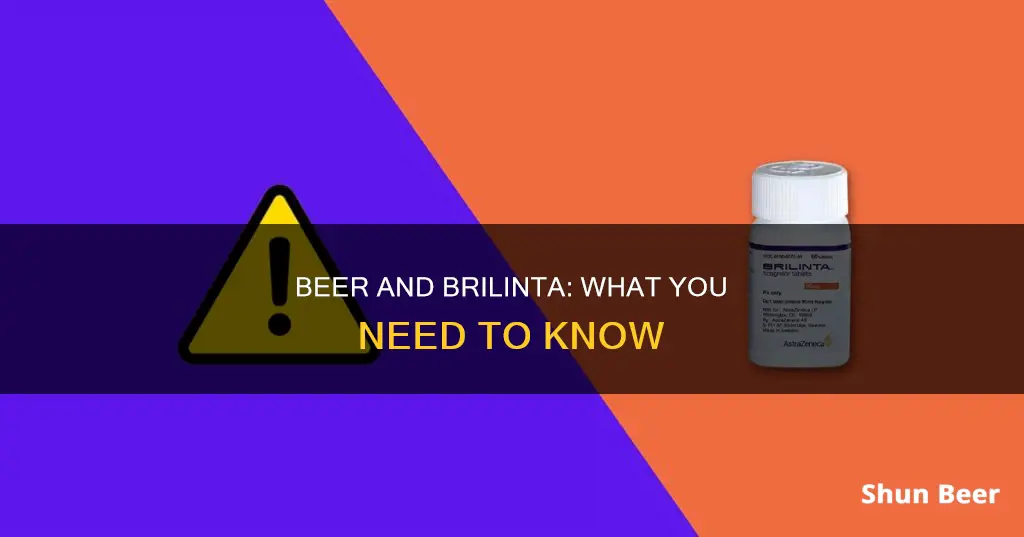
Brilinta (ticagrelor) is a prescription drug used to reduce the risk of heart attack, stroke, and cardiovascular-related death in adults with certain cardiovascular conditions. It is approved by the FDA and is typically taken twice a day. While there is no explicit warning or known interaction between Brilinta and alcohol, it is generally recommended to avoid combining the two, especially in excessive amounts, due to their similar effects on blood clotting and the potential increased risk of bleeding. Additionally, Brilinta is usually taken with a daily dose of aspirin, which further increases the risk of bleeding when combined with alcohol. Therefore, it is crucial to consult with a healthcare provider to determine if it is safe to consume alcohol while taking Brilinta.
| Characteristics | Values |
|---|---|
| Should I drink beer with Brilinta? | It is not recommended to drink alcohol while taking Brilinta as it can increase your risk of bleeding. |
| Why? | Brilinta and alcohol both thin your blood and decrease your blood's ability to form clots. |
| What increases the risk? | Excessive alcohol consumption, chronic alcohol use, or alcohol abuse. |
| What drugs does Brilinta interact with? | Simvastatin, ibuprofen, aspirin, St. John's wort, and grapefruit juice. |
| What are the side effects of Brilinta? | Dizziness, nausea, and stomach upset. |
What You'll Learn
- Brilinta and alcohol may increase the risk of bleeding
- Combining Brilinta with aspirin may increase the risk of bleeding
- Brilinta is not recommended for those with active bleeding
- Brilinta is not recommended for those with a history of brain haemorrhage
- Brilinta is not recommended for those with a history of allergic reaction to the drug

Brilinta and alcohol may increase the risk of bleeding
Brilinta (ticagrelor) is a prescription drug that helps to lower the risk of heart attack, stroke, and cardiovascular-related death in adults with certain cardiovascular conditions. It is classified as a P2Y12 inhibitor and works by making your platelets less sticky to help prevent blood clots from forming.
While there is no direct interaction between Brilinta and alcohol, consuming alcohol while taking Brilinta may further increase your risk of bleeding. This is because both Brilinta and alcohol may prevent blood from clotting. Therefore, combining the two may increase the risk of bleeding.
The risk of bleeding may be especially high if you are also taking aspirin, which is often prescribed alongside Brilinta. Combining aspirin with alcohol can lead to stomach bleeding and ulcers. Therefore, it is generally recommended to avoid alcohol consumption while taking Brilinta, especially if you are also taking aspirin.
Additionally, heavy or chronic alcohol use may further increase the risk of bleeding. According to the National Institute on Alcohol Abuse and Alcoholism (NIAAA), excessive alcohol consumption is defined as more than four drinks per day for men or more than seven drinks per week for women.
If you have any concerns or questions about Brilinta and alcohol use, it is important to consult with your healthcare provider for personalized advice. They can assess your individual risk factors and provide recommendations accordingly.
Bottom-Fill Beer: How Does It Work?
You may want to see also

Combining Brilinta with aspirin may increase the risk of bleeding
Brilinta (ticagrelor) is a prescription antiplatelet medication used to prevent strokes and dangerous blood clots. It works by blocking the P2Y12 receptor on platelets to prevent platelet activation. This makes platelets in the blood less sticky, so they don't form clots as easily. It is often prescribed to prevent heart attacks and strokes in people with acute coronary syndrome (ACS) or a history of a heart attack.
Aspirin is also a blood thinner and is often taken daily along with Brilinta. While low-dose aspirin (81 mg) can be combined with Brilinta if recommended by a healthcare provider, higher doses of aspirin (over 100 mg) should be avoided. Higher doses of aspirin can make Brilinta less effective, increasing the risk of unwanted blood clots.
The combination of Brilinta and aspirin may increase the risk of bleeding, especially when taken with other substances that affect blood clotting, such as alcohol. Alcohol, particularly in excessive amounts, can further increase the risk of bleeding. Men who drink more than four drinks on any given day or more than 14 drinks per week may have a high risk of bleeding while taking Brilinta and aspirin. Similarly, women who drink more than three drinks on any given day or more than seven drinks per week may also be at high risk.
Therefore, it is generally recommended to avoid alcohol consumption while taking Brilinta and aspirin to minimise the risk of bleeding. If you have concerns or questions about combining Brilinta, aspirin, and alcohol, it is important to consult with your healthcare provider for personalised advice.
Exploring Cairo's Beer Scene: What to Know Before Drinking
You may want to see also

Brilinta is not recommended for those with active bleeding
Brilinta (ticagrelor) is a prescription drug used to lower the risk of heart attack, stroke, and cardiovascular-related death in adults with certain cardiovascular conditions. It is typically taken twice a day, in the morning and evening, along with a daily maintenance dose of aspirin. While there is no known direct interaction between Brilinta and alcohol, it is generally recommended to avoid consuming alcohol while taking this medication. This is because both Brilinta and alcohol can increase your risk of bleeding by preventing blood from clotting effectively.
Now, let's discuss why Brilinta is not recommended for those with active bleeding in more detail:
Increased Risk of Bleeding:
The primary reason Brilinta is not advised for individuals with active bleeding is the heightened risk of bleeding. Brilinta is an antiplatelet medication, which means it inhibits the ability of platelets in the blood to clump together and form clots. If you are already experiencing bleeding, such as from a peptic ulcer or colon polyp, Brilinta can exacerbate the situation by hindering the body's natural clotting process. This could lead to more severe and life-threatening bleeding. It is crucial to treat any active bleeding before starting Brilinta to ensure a safer outcome.
Potential Drug Interactions:
When taking Brilinta, it is essential to be cautious about drug interactions that can further impact bleeding. For example, combining Brilinta with aspirin, which is often prescribed alongside it, can increase the risk of stomach ulcers and bleeding. Additionally, certain medications like nonsteroidal anti-inflammatory drugs (NSAIDs) and blood thinners can also enhance the risk of bleeding when taken with Brilinta. It is imperative to consult your doctor and disclose all medications and supplements you are taking to prevent harmful interactions.
Health Conditions and Contraindications:
Brilinta may not be suitable for individuals with specific health conditions that increase the risk of bleeding. For instance, if you have a history of intracranial hemorrhage (bleeding inside the head), Brilinta is typically not recommended as it can elevate the risk of rebleeding. Similarly, if you have a severe liver problem, such as cirrhosis, your doctor may suggest alternative treatments due to the unknown safety profile of Brilinta in such cases. It is crucial to be transparent with your doctor about your medical history and any ongoing health issues.
Lifestyle Factors:
Lifestyle choices, such as consuming grapefruit or grapefruit juice, can also impact the effectiveness and safety of Brilinta. Grapefruit products can inhibit the enzyme responsible for breaking down Brilinta, leading to increased exposure to the drug and a heightened risk of bleeding. Therefore, it is generally advised to avoid grapefruit and grapefruit juice while taking Brilinta. Additionally, if you have recently had surgery or suffered a serious injury, your doctor may need to manage any bleeding before starting Brilinta to mitigate potential complications.
In summary, Brilinta is not recommended for individuals with active bleeding because it can worsen the bleeding and lead to severe or life-threatening situations. It is crucial to consult your doctor and carefully consider your medical history, current medications, and lifestyle choices before taking Brilinta to ensure safe and effective use.
Drinking Beer and Taking Nitrofurantoin: What You Should Know
You may want to see also

Brilinta is not recommended for those with a history of brain haemorrhage
Brilinta (ticagrelor) is a prescription drug that helps lower the risk of heart attack and stroke. It is an antiplatelet medication, which means it prevents platelets in the blood from sticking together to form blood clots. While this drug is beneficial for many people, it is not recommended for those with a history of brain haemorrhage.
Brilinta is a powerful blood thinner, and it increases the risk of bleeding. People with a history of brain haemorrhage (bleeding inside the head) are at a higher risk of bleeding again if they take Brilinta. This is because the drug interferes with the blood's ability to form clots. Therefore, it is not considered safe for people with a history of brain haemorrhage to take Brilinta.
Doctors will usually recommend alternative treatments for people with a history of brain haemorrhage. It is crucial to consult a doctor before taking Brilinta to ensure it is safe for you. They will assess your health history and determine whether Brilinta is the right treatment for you.
In addition to avoiding Brilinta if you have a history of brain haemorrhage, it is also important to note that you should not take Brilinta if you are currently bleeding or have an active bleeding condition, such as a peptic ulcer or colon polyp. Brilinta can cause you to bleed more, so it is essential to treat any active bleeding before starting this medication.
It is also worth mentioning that Brilinta is typically taken with a daily dose of aspirin, which can further increase the risk of bleeding. Therefore, consuming alcohol while taking Brilinta and aspirin is not recommended as it may further elevate the chances of bleeding.
Beer and Clomid: Safe Mix or Health Risk?
You may want to see also

Brilinta is not recommended for those with a history of allergic reaction to the drug
Brilinta (ticagrelor) is a prescription drug that helps to lower the risk of heart attack and stroke in adults. It is typically taken twice a day, in the morning and the evening, and is used in combination with a daily maintenance dose of aspirin.
If you have experienced an allergic reaction to Brilinta, it is important to consult your doctor about alternative treatments. It is crucial to disclose your full medical history, including any allergic reactions, before taking any new medication.
In addition to allergic reactions, there are other contraindications for Brilinta. For example, it is not recommended for those with a history of intracranial hemorrhage or active bleeding, such as a peptic ulcer. Brilinta can also interact with certain medications, supplements, and health conditions, so it is important to discuss any potential interactions with your doctor before taking this drug.
The Magic of Beer Batter: Science Behind the Fizz
You may want to see also
Frequently asked questions
It is not recommended to drink alcohol while taking Brilinta as it can increase your risk of bleeding. Both Brilinta and alcohol thin the blood and prevent blood from clotting, so consuming alcohol while taking Brilinta may further increase your risk of bleeding.
The combination of Brilinta, alcohol, and aspirin may increase the risk of bleeding. This is because Brilinta and alcohol both have blood-thinning properties, and aspirin is often taken alongside Brilinta as a blood thinner. Heavy alcohol consumption, in particular, can increase the risk of bleeding.
The side effects of alcohol and Brilinta may overlap, with both substances causing dizziness, nausea, and stomach upset. Combining the two may increase the risk of experiencing these side effects.
Light-to-moderate alcohol consumption is generally not expected to cause significant harm when combined with Brilinta. However, it is still recommended to use caution and consult with your healthcare provider to determine a safe amount of alcohol consumption while taking this medication.







